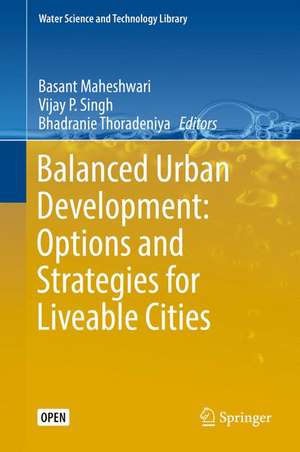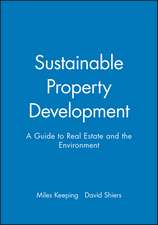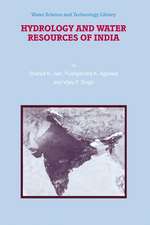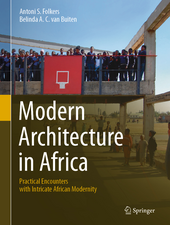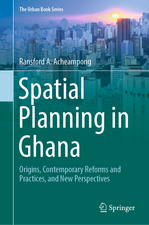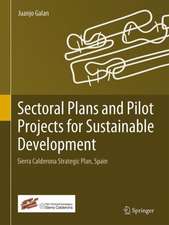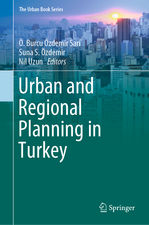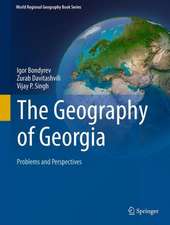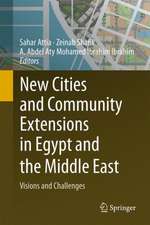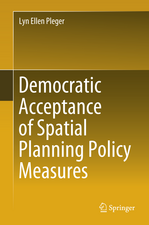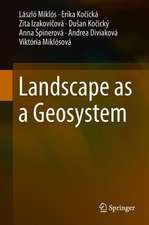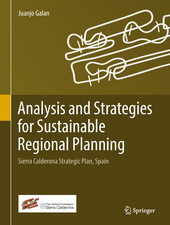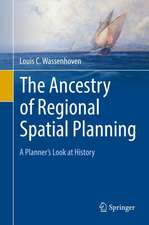Balanced Urban Development: Options and Strategies for Liveable Cities: Water Science and Technology Library, cartea 72
Editat de Basant Maheshwari, Vijay P. Singh, Bhadranie Thoradeniyaen Limba Engleză Hardback – 7 sep 2016
There are growing concerns about water, food security and sustainability with increased urbanisation worldwide. For cities to be liveable and sustainable into the future there is a need to maintain the natural resource base and the ecosystem services in the peri-urban areas surrounding cities. This need is increasing under the looming spectre of global warming and climate change.
This book will be of interest to policy makers, urban planners, researchers, post-graduate students in urban planning, environmental and water resources management, and managers in municipal councils.
| Toate formatele și edițiile | Preț | Express |
|---|---|---|
| Paperback (1) | 401.80 lei 38-45 zile | |
| Springer International Publishing – 9 iun 2018 | 401.80 lei 38-45 zile | |
| Hardback (1) | 459.43 lei 3-5 săpt. | |
| Springer International Publishing – 7 sep 2016 | 459.43 lei 3-5 săpt. |
Din seria Water Science and Technology Library
- 18%
 Preț: 950.96 lei
Preț: 950.96 lei - 15%
 Preț: 646.62 lei
Preț: 646.62 lei - 24%
 Preț: 796.90 lei
Preț: 796.90 lei - 19%
 Preț: 546.76 lei
Preț: 546.76 lei - 18%
 Preț: 953.65 lei
Preț: 953.65 lei - 18%
 Preț: 742.31 lei
Preț: 742.31 lei - 18%
 Preț: 1226.11 lei
Preț: 1226.11 lei - 18%
 Preț: 956.50 lei
Preț: 956.50 lei - 18%
 Preț: 1225.48 lei
Preț: 1225.48 lei - 18%
 Preț: 776.40 lei
Preț: 776.40 lei - 18%
 Preț: 1014.76 lei
Preț: 1014.76 lei - 18%
 Preț: 957.13 lei
Preț: 957.13 lei - 24%
 Preț: 744.68 lei
Preț: 744.68 lei - 18%
 Preț: 953.35 lei
Preț: 953.35 lei - 18%
 Preț: 1108.04 lei
Preț: 1108.04 lei - 18%
 Preț: 1121.65 lei
Preț: 1121.65 lei - 15%
 Preț: 644.63 lei
Preț: 644.63 lei - 18%
 Preț: 1116.71 lei
Preț: 1116.71 lei - 18%
 Preț: 731.91 lei
Preț: 731.91 lei - 24%
 Preț: 744.31 lei
Preț: 744.31 lei - 18%
 Preț: 894.46 lei
Preț: 894.46 lei - 18%
 Preț: 1020.74 lei
Preț: 1020.74 lei - 24%
 Preț: 945.40 lei
Preț: 945.40 lei -
 Preț: 553.51 lei
Preț: 553.51 lei - 18%
 Preț: 1009.08 lei
Preț: 1009.08 lei
Preț: 459.43 lei
Nou
Puncte Express: 689
Preț estimativ în valută:
87.91€ • 91.79$ • 72.76£
87.91€ • 91.79$ • 72.76£
Carte disponibilă
Livrare economică 14-28 martie
Preluare comenzi: 021 569.72.76
Specificații
ISBN-13: 9783319281100
ISBN-10: 3319281100
Pagini: 475
Ilustrații: XXII, 601 p. 136 illus., 109 illus. in color.
Dimensiuni: 155 x 235 x 37 mm
Greutate: 1.32 kg
Ediția:1st ed. 2016
Editura: Springer International Publishing
Colecția Springer
Seria Water Science and Technology Library
Locul publicării:Cham, Switzerland
ISBN-10: 3319281100
Pagini: 475
Ilustrații: XXII, 601 p. 136 illus., 109 illus. in color.
Dimensiuni: 155 x 235 x 37 mm
Greutate: 1.32 kg
Ediția:1st ed. 2016
Editura: Springer International Publishing
Colecția Springer
Seria Water Science and Technology Library
Locul publicării:Cham, Switzerland
Public țintă
ResearchCuprins
Part I: Introduction.- 1. Balanced Urban Development: Is it a myth or reality? - Part II: Peri-Urbansation.- 2. Re-Ruralising the Urban Edge: Lessons from Europe, USA & the Global South.- 3. Nimbyism and Nature – Whose Backyard is it Anyway? - 4. Connecting Urban and Rural Futures Through Rural Design.- 5. Archaeology and Contemporary Dynamics for More Sustainable, Resilient Cities in the Peri-Urban Interface.- 6. Decontamination of Urban Run-off: Importance and Methods.- Part III: Peri-Urban Culture and Socio-Economy.- 7. Socio-economy of Peri-Urban Areas: The Case of Lisbon Metropolitan Area.- 8. Changing Economic Scenario of the Peri-Urban Area of Udaipur City, India.- 9. Community Stakeholder Viewpoints on Issues of Urbanisation along the River Ma Oya, Sri Lanka.- Part IV: Peri-Urban Landuse Planning.- 10. The role of peri-urban land use planning in resilient urban agriculture: a case study of Melbourne, Australia.- 11. Engaging Peri-Urban Landholders in Natural ResourcesManagement.-12. Urban Farming Master Plan in Western Sydney - From Planning to Reality.- Part V: Urban Water Security.- 13. Study of urban water bodies in view of potential for micro-climatic cooling and natural purification of waste water.- 14. Groundwater Crisis in a Mega City – A Case Study of New Delhi, India.- 15. Safe Water Supply Determinants in Peri-Urban Communities of South-East Nigeria.- 16. Risks of Coal Seam and Shale Gas Extraction on Groundwater and Aquifers in Eastern Australia.- Part VI: Wastewater and Irrigation.- 17. Use of recycled water for irrigation of open spaces: Benefits and Risks.- 18. Global Experiences on Wastewater Irrigation: Challenges and Prospects.- 19. Impacts of Wastewater Reuse on Peri-Urban Agriculture: Case Study in Udaipur City, India.- Part VII: Urban Agriculture and Food Security.- 20. Urban Agriculture in Cuba: Alternative Legal Structures, Crisis and Change.- 21. High quality agricultural land in Western Australia – A new decision toolfor planning.- 22. Food Efficient Planning and Design for Peri-urban Neighbourhoods.- 23. Role of Peri-urban Areas in the Food System of Kampala, Uganda.- Part VIII: Climate Change Impacts and Adaptations.- 24. Climate Change Adaptation Planning with Peri-Urban Local Government in Victoria, Australia.- 25. Awareness of Climate Change Impacts and Adaptation at Local Level in Punjab, Pakistan.- 26. Urbanisation, Nutrition and Food Security: A Climatological Perspective.- 27. Coastal Urban and Peri-Urban Indigenous People’s Adaptive Capacity to Climate Change.- Part IX: Legal, Policy and Institutional Challenges.- 28. Effect of Social and Institutional Fragmentation on Collective Action in Peri-urban Settings.- 29. Gentrification versus Territorialisation: The Peri-Urban Agriculture Area in Beirut.- 30. Reimagining the “Peri-Urban” in the Mega-Urban Regions of Southeast Asia.- Part X: Integrated Urban Development.- 31. Sustainability of Water Resources in Peri-urban Landscapes: Learning from the Journey of Engagement.- 32. Development of Future Management Options for the Hawkesbury River.- 33. Planning Development to Reduce Mosquito Hazard in Coastal Peri-Urban Areas: Case Studies in NSW, Australia.- 34. An Integrated Simulation and Visualisation Platform for the Design of Sustainable Urban Developments in a Peri-Urban Context.- 35. Options and Strategies for Balanced Development for Liveable Cities: An Epilogue.
Recenzii
Notă biografică
Textul de pe ultima copertă
This book provides a unique synthesis of concepts and tools to examine natural resource, socio-economic, legal, policy and institutional issues that are important for managing urban growth into the future. The book will particularly help the reader to understand the current issues and challenges and develop strategies and practices to cope with future pressures of urbanisation and peri-urban land, water and energy use challenges. In particular, the book will help the reader to discover underlying principles for the planning of future cities and peri-urban regions in relation to: (i) Balanced urban development policies and institutions for future cities; (ii) Understanding the effects of land use change, population increase, and water demand on the liveability of cities; (iii) Long-term planning needs and transdisciplinary approaches to ensure the secured future for generations ahead; and (iv) Strategies to adapt the cities and land, water and energy uses for viable and liveable cities.
There are growing concerns about water, food security and sustainability with increased urbanisation worldwide. For cities to be liveable and sustainable into the future there is a need to maintain the natural resource base and the ecosystem services in the peri-urban areas surrounding cities. This need is increasing under the looming spectre of global warming and climate change.
This book will be of interest to policy makers, urban planners, researchers, post-graduate students in urban planning, environmental and water resources management, and managers in municipal councils.
Caracteristici
Draws comprehensively upon concepts and international case studies that will assist in sound peri-urban planning Presents a distinct synthesis of a range of disciplines, including hydrology, peri-urban agriculture, social, economic, legal, institutional and policy aspects Contains a rich resource of unpublished data, examples and illustrations Provides a unique reference to tackle future urbanisation issues and challenges of interest to a wide audience of researchers, planners, consultants and students
